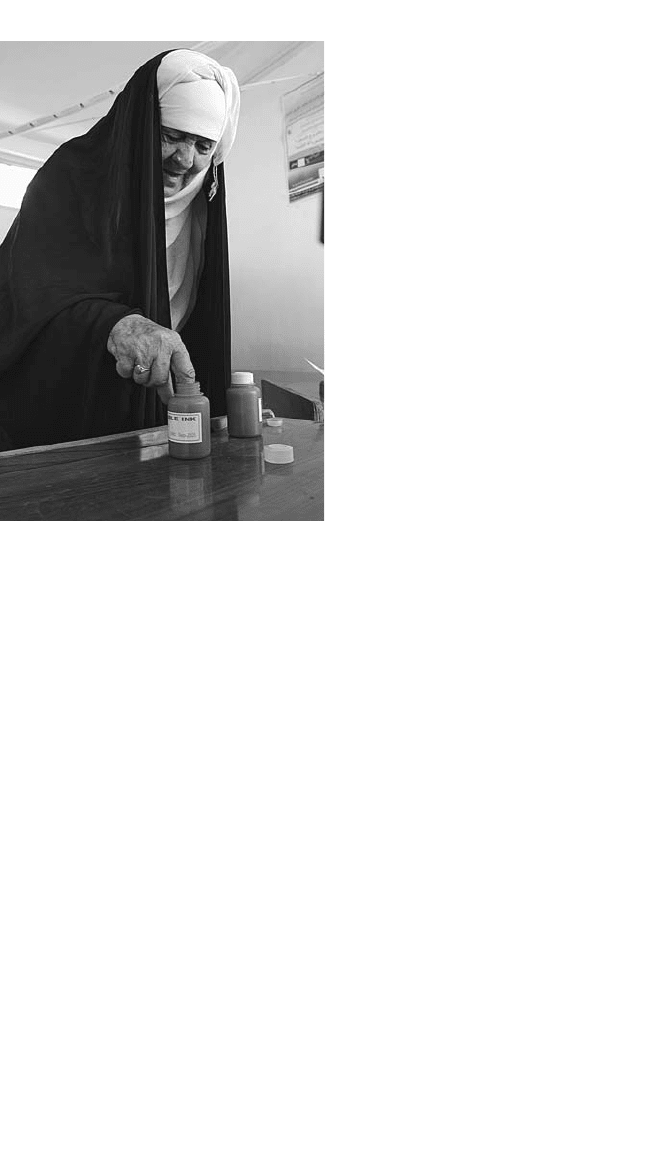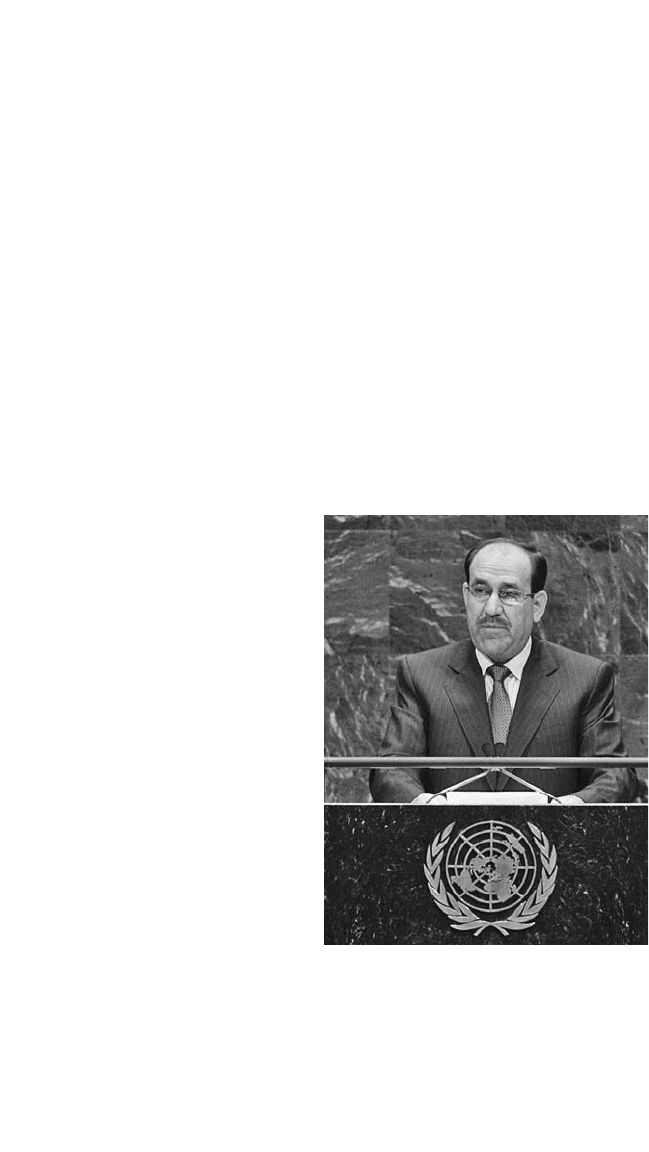Fattah H., Caso F. A Brief History Of Iraq
Подождите немного. Документ загружается.


A BRIEF HISTORY OF IRAQ
262
referendum and the subse-
quent elections of December
2005. In the former, it was
declared that 63 percent of
Iraqis voted in the referendum
and that 78 percent of these
favored the new constitution.
However, the vote was actually
closer than that because the
referendum was not a straight
up and down majority vote. It
was decided beforehand that
even if a majority of Iraqis
favored the draft constitution,
if three of Iraq’s 18 provinces
voted against the constitution
by a two-thirds majority or
greater, then not only would
the constitution have to be
redrafted, but the National
Assembly would be dissolved
(since the National Assembly
had passed the draft constitu-
tion for referendum vote) and
new elections set. Despite sec-
tarian differences, with most Arab Sunnis opposing the draft constitu-
tion, only two of the provinces, Salahad-Din and al-Anbar, both heavily
Sunni, voted against the draft constitution by the stipulated two-thirds.
With the passing of the draft constitution, Iraq became a federal nation,
a move pushed by the Kurds. The Presidential Council announced soon
after the referendum that new legislative elections (under the auspices
of the new constitution) would be held on December 15, 2005.
The Permanent Government
The December election for the new Iraq Council of Representatives
attracted approximately 70 percent of Iraq’s registered voters who chose
from lists of parties and coalitions rather than specifi c candidates.
Furthermore, a minimum of 25 percent (or 69 seats) of the 275 seats
to the council were dedicated to women. As with the referendum two
months earlier, far more Sunnis turned out to vote than had been the
A woman prepares to vote on the referendum
for Iraq’s constitution, October 15, 2005. The
constitution passed, thus paving the way for
Iraq’s permanent government.
(AP Photo/
Mohammed Hato)

263
THE WAR IN IRAQ
case with the January 2005 election for the National Assembly, which
most Sunnis believed was unfairly stacked against them. The result,
confi rmed on February 10, 2006, was a more balanced legislature. The
United Iraqi Alliance (UIA), a Shii coalition, still led the lists with 128
seats—of these the Sadrist Movement was allocated the most seats in
the coalition, 28—but this was a net loss of 12 seats from the National
Assembly. The second highest number of seats, 53, went to another
coalition, the Democratic Patriotic Alliance of Kurdistan, but it too
suffered a net loss from the number of seats it held in the National
Assembly. The biggest gains went to the Sunni and Sunni-led coalitions.
The Iraqi Accord Front and the Iraqi Front for National Dialogue, both
of which were unrepresented in the National Assembly, received 44 and
11 seats, respectively. This placed them third and fi fth among the coali-
tions on the Council of Representatives.
POLITICAL PARTIES AND
COALITIONS OF THE
PERMANENT GOVERNMENT
S
ince Iraqis were not voting for specifi c candidates in the
December 2005 elections, coalitions among the more than 50
political parties became important to garner more votes. Of the
various coalitions, the most important were the United Iraqi Alliance
(UIA), a Shii coalition; the Democratic Patriotic Alliance of Kurdistan;
the Iraqi Accord Front, a Sunni coalition; the Iraqi Front for National
Dialogue, a Sunni-led but mixed coalition; and the leftist Iraqi National
List. Like many political coalitions, there was bickering among the
parties (especially the UIA) and various amounts of fracturing. The
coalition parties at the time of the formation of the permanent gov-
ernment included the following:
United Iraqi Alliance
• Supreme Council of the Islamic Revolution in Iraq (SCIRI),
which later changed its name to Supreme Islamic Iraqi Council
(SIIC), led by Abdul Aziz al-Hakim
• Islamic Daawa Party, led by Nouri al-Maliki
• Sadrist Movement, led by Moqtada al-Sadr
(continues)

A BRIEF HISTORY OF IRAQ
264
• Islamic Virtue Party, led by Abdulrahim al-Hasini
• Islamic Daawa Party—Iraq Organization, led by Abdul Karim al-
Anizi
• Badr Organization, the militia of SCIRI, which was a separate
member of the coalition but has since been folded into the Iraqi
military and security forces
Democratic Patriotic Alliance of Kurdistan
• Kurdistan Democratic Party, led by Massoud al-Barzani
• Patriotic Union of Kurdistan, led by Jalal Talibani
• Kurdistan Workers Pa rty
• Kurdistan Communist Party—Iraq, led by Kamal Shakir
• Islamic Group Kurdistan, led by Ali Bapir
• Iraqi Turkmen Brotherhood Party, led by Walid Sharika
Iraqi Accord Front
• Iraqi Islamic Party, led by Tariq al-Hashemi
• Iraqi National Dialogue Council, led by Khalaf al-Ulayyan
• General Council for the People of Iraq
Iraqi Front for National Dialogue
• Iraqi National Front, led by Saleh al-Mutlaq
• National Front for a Free and United Iraq, led by Hassan Zaydan
• Iraqi Christian Democratic Party, led by Minas al-Yusufi
• Democratic Arab Front, led by Farhan al-Sudayd
• Sons of Iraq Movement, led by Ali al-Suhayri
In addition, the Iraqi National List, led by Ayad Allawi, included 16
parties and small coalitions, such as the Iraqi Communist Party, the
Assembly of Independent Democrats, the People’s Union, the Arab
Socialist Movement, the Iraqi Republican Group, and Allawi’s Iraqi
National Accord.
Numerous other parties sprang into being either in the late
Hussein period or after his downfall representing monarchists; leftists
not in the Iraqi National List, including three other communist parties
and the Green Party; smaller Sunni and Kurdish parties; and Turkish,
Yazdi, and Assyrian Christian blocs. The only political party banned by
Iraqi law was the Baath Party.
POLITICAL PARTIES AND COALITIONS OF
THE PERMANENT GOVERNMENT (continued)

265
THE WAR IN IRAQ
The various coalitions went into caucus to decide how best to put
forth their candidates for the government posts. Notably, there was a
split within the UIA over who should be put forth as prime minister
(that the prime minister would be a Shii was a given considering the
number of seats held by the Shii coalitions). Ibrahim al-Jafaari actually
won a UIA vote but in the end fell to political machinations, includ-
ing behind-the-scenes pressure by the United States, which feared his
closeness to the Sadrist Movement, now demonized by the coalition.
The wrangling lasted until late April, when Nouri al-Maliki, a member
of the Daawa Party (which was part of the UIA coalition) was chosen as
a compromise candidate. In keeping with the form of the constitution,
on April 22, 2006, al-Maliki was designated by President Jalal Talibani,
himself reelected by the Council of Representatives on April 6, 2006,
and sworn in the next day. The reelection of Talibani, a Kurd, was tes-
tament to the increased infl uence the Kurds now enjoyed in Iraq. Al-
Malili was sworn in as prime minister on May 20, 2006, the day the new
government took over.
Besides security and sectar-
ian violence, the most urgent
problems facing Iraq’s govern-
ment were the wrecked econ-
omy, the decreased energy
output, massive food short-
ages, and a shattered health
care system. In the years since
taking power, the government
received massive amounts
of foreign aid to help offset
these problems, but it also
took steps of its own to allevi-
ate them. Oil continued to be
Iraq’s main export, but other
industries showed signs of
either slow revival or birth.
These accounted for about 15
percent of Iraq’s exports. Iraq’s
main imports were food and
medicines, showing in that
respect that little had changed
from the sanction days. Prior
Prime Minister Nuri al-Maliki of Iraq addresses
the UN General Assembly on September 26,
2007. Al-Maliki, leader of the Shii Daawa
Party, became Iraq’s fi rst prime minister under
the constitutional permanent government on
May 20, 2006.
(AP Photo)

A BRIEF HISTORY OF IRAQ
266
to the government’s taking control, only a little more than half of all
Iraqis had access to potable water, but several water projects were sub-
sequently undertaken, including a new canal to supply drinking water
to Basra. However, the water crisis in Baghdad had not been alleviated
fi ve years after its fall to coalition forces. The Iraqi government also
encouraged foreign investment not only in the usual oil industry sector
but also in the electricity sector, hoping to give impetus to an industry
nearly shut down by the war and the insurgency.
By 2008, neither the government nor foreign aid had been able to repair
Iraq’s broken health-care system. Doctors, nurses, and other health-care
workers continued to fl ee the country as part of the Iraqi diaspora, while
the rebuilding of hospitals and clinics was behind schedule. The emigra-
tions and the high numbers of those leaving the health-care fi eld in Iraq
meant that Iraq had only about one-quarter of the number of health-care
workers it had prior to the invasion. Poor water and frequent electrical
blackouts contributed to the problems. A Reuters article by Luke Baker
cited a report by the health organization Medact, which pointed out that
only 4 percent of the $18 billion Iraqi reconstruction fund was slated
for health care. While the report suggests an increase in government
involvement, others have blamed the government, particularly the health
ministry, for its failure to alleviate the problem.
Further complications for Iraq’s government arose in 2008. Foremost
among these was the insurrection of the Mahdi Army, the Shii militia
controlled by Moqtada al-Sadr. Six months after the British forces
departed from Basra in September 2007 (at the time perhaps the most
stable city in Iraq) the Mahdi Army, bolstered by the surreptitious
delivery of arms from Iran, not to mention Iranian president Mahmoud
Ahmadinejad’s March visit to Iraq, began an insurgency in Basra that
was a direct threat to Shii Prime Minister al-Maliki’s rule. Nevertheless,
al-Maliki traveled to Basra as a sign of support for the Iraqi security
forces and the civilians. The insurgency lasted until the end of April.
Late in April al-Sadr threatened war against Iraqi and U.S. forces,
but after the defeat of the Mahdi Army in Basra and retaliations in
Sadr City, the Shii neighborhood of northern Baghdad, he agreed to a
(fragile) cease-fi re on May 11. The victory not only boosted the morale
of the Iraqi security forces but solidifi ed al-Maliki’s position among the
Sunnis and Kurds. Al-Maliki thereupon turned his attention to Mosul,
the stronghold of the Sunni al-Qaeda in Iraq. Four months earlier he
had promised to rid the city of the group, and on May 14, repeating
his successful Basra strategy, he traveled to Mosul to take charge of the
military operations in Iraq’s third-largest city.

267
THE WAR IN IRAQ
Conclusion
It will take years before all of the facts regarding the buildup to the
invasion of Iraq are made public (if ever), but the U.S. motive of regime
change is undeniable. Equally undeniable is that many Iraqis suffered
under the Baathists, primarily Shiis and Kurds. A third undeniable fact is
that the nation of Iraq has suffered on an unprecedented scale in its his-
tory as a result of the invasion and poor planning for the aftermath of the
overthrow of Saddam Hussein. From the Arab Iraqi perspective, the after-
math has been far worse than the invasion. Only the Kurds have truly
benefi ted in the post-Hussein era, having their plan for a federalist Iraq
accepted and one of their leaders, Jalal Talibani, twice elected president.
Five years after the U.S.-led coalition invasion, Iraq lay in ruins,
wracked by war, terrorism, and sectarian civil war. The number of refu-
gees approached 4 million, or 16 percent of the total population, split
nearly evenly among those who fl ed the country and those who were
displaced within Iraq. It is believed that 40 percent of Iraq’s middle class
had fl ed. More than 600,000 people had died as a result of violence since
the March 2003 invasion, and the majority of these deaths occurred
after the fall of the Baathist regime. Health care in Iraq is in shambles,
and in a conference held in Baghdad in December 2007, it was revealed
that as many as 5 million Iraqi children had been orphaned, accounting
for nearly 35 percent of the child-age population.
A World Public Opinion poll titled “The Iraqi Public on the U.S. Presence
and the Future of Iraq,” conducted by the Program on International Policy
Attitudes and released on September 27, 2006, revealed that “seven in ten
Iraqis want U.S.-led forces to commit to withdrawal within a year,” and
that “an overwhelming majority believes that the U.S. presence in Iraq is
provoking more confl ict than it is preventing.” Six in 10 Iraqis also sup-
ported attacks on U.S. forces as part of a perception that the United States
planned to build permanent U.S. military bases in their country. Overall,
the poll revealed that Iraqis favored the central government and even
favored the continued training of their security forces by the U.S. military.
Prime Minister al-Maliki was the only Shii leader favored by Kurds and
some Sunnis as well as Shiis. However, public opinion of other Shii leaders
and many issues were split along sectarian lines, with Kurds generally in
agreement with Sunni Arabs. A 2007 BBC poll showed that the percent-
ages of those Iraqis opposing the coalition’s presence in Iraq rose to 78
percent, and the percentage who thought the coalition’s presence was
making things worse also increased. Essentially, these polls revealed the
hopes and frustrations of the Iraqis and their desires to settle their own
problems with foreign assistance, but not interference.

268
POSTSCRIPT
W
hen U.S. troops entered Baghdad on April 9, 2003, it was after a
relatively easy victory over the Iraqi army and irregular militias.
Immediately, U.S. leaders in charge began to disestablish the remnants
of the Iraqi state. One of the fi rst edicts passed on June 17, 2003, by the
new “viceroy,” Paul L. Bremer III, was the dissolution of the Iraqi army.
Other pronouncements on the same date annulled the Ministries of
Defense and Information and began the process of “deBaathifi cation,”
which was supposed to eradicate by the root all the ideological, politi-
cal, and security excesses incurred under 35 years of Baathist rule in
Iraq. The hope was that, by dismissing thousands of Baathist profes-
sors, government offi cials, and army offi cers, any national government
following in the wake of the U.S. military administration would begin
with a clean slate. But it was not so simple. Undeterred by thousands
of years of history, the Americans blundered into a country of which
they knew virtually nothing. Their comeuppance was to begin almost
immediately.
The U.S. plan for postwar Iraq, such as it was, was based on a radical
blueprint worked out partly in secret by neoconservative ideologues in
the Bush administration, with the aid of fellow travelers in American
right-wing think tanks and select members of the Iraqi opposition in
exile (Naomi Klein, 2004). According to this blueprint, Iraq, the “failed
state,” was to be the theater for a massive restructuring exercise that
would jettison the dirigiste command economy, dismantle the trappings
of the authoritarian state structure, and open wide the doors to the
benefi ts of an untrammeled free market. Although Bremer immediately
signaled his intention to aggressively conform to this agenda, several
events conspired to waylay his strategy.
One important reason why the blueprint did not immediately mate-
rialize was the American disregard for history, especially Iraq’s own.
This allowed the administration to concoct a pastiche of traditions
and principles, mostly imbibed from British rule in Iraq in the period
between 1917 and 1932. For instance, it believed that the greatest
army in the world could easily control the country on its own and that
a military institution suffi ced to run the country. However, exactly as

269
POSTSCRIPT
had happened under the British, the administration was soon forced to
change at least the externals of this plan (even under Bremer’s civilian
administration, the army still ran a signifi cant part of the operation).
After months of pretending that he could govern Iraq alone, however,
Bremer was ultimately forced to bring the Iraqis into government, cir-
cumscribed though it was by lack of real power and sovereign control.
The Governing Council was appointed by Bremer on July 13, 2003; it
was composed of 25 members from different ethnic, confessional, and
linguistic groups. Again, in direct imitation of the seemingly easily
tradable “traditions” of the fi rst Iraqi government under British occu-
pation, in which the elderly Shaikh Abdul-Rahman al-Gailani took on
the post of prime minister, the equally venerable Sayyid Muhammad
Bahr al-Ulum (an 80-year-old former exile) became the most infl uential
voice on the council. The sole difference, of course, and this was an
important change, was that al-Gailani had been a Sunni Muslim and
Bahr al-Ulum is a Shii.
Exactly as had happened under the British, revolts began to brew.
While not attaining the momentum of the Iraqi uprising of 1920
against the British, on a piecemeal basis, these revolts made the United
States very uncomfortable. In fact, the burgeoning Iraqi insurgency;
the seemingly endemic corruption in the fi rst contracts awarded to
big American multinationals; the lackadaisical attempts to fi x electric-
ity, sewage, and water plants; the skyrocketing rate of unemployment;
the indiscriminate arrest and imprisonment of random (and, quite
frequently, innocent) civilians that the American troops had come to
liberate; and the arrogance of the Coalition Provisional Administration’s
bureaucrats with regard even to their Iraqi allies created the conditions
for a national emergency. While at fi rst the Americans were fortunate
that no two sects or parties made common cause against the occupa-
tion, by the beginning of 2006, the situation had become so dire that
almost 2,200 U.S. service personnel had been killed (the number of
Iraqis who died was a state secret, but independent sources, most nota-
bly the British Lancet study of October 2004, put the fi gure at close to
100,000 civilians dead).
Quickly taking a page out of British colonialist strategy in Iraq, and
egged on all the while by the most infl uential Shii ayatollah in Iraq,
Sayyid Ali al-Sistani, the Americans pushed forward national elections
as the solution for a free and independent Iraq. In January 2005, sev-
eral million Iraqis braved bombs and indiscriminate violence to vote
for their parties’ choice of candidates. The “mandate for change” (in
President George Bush’s terminology) ushered in a Shii majority led by

A BRIEF HISTORY OF IRAQ
270
a political coalition grouping powerful religious parties with a smatter-
ing of secular groups. Meanwhile, a referendum on an Iraqi constitu-
tion in October was passed, not to everyone’s satisfaction. In December
2005, Iraqis went to the polls again, to elect a permanent four-year
government. After several months of wrangling, the political stalemate
produced by Shii negotiations with the Kurds and Sunnis suddenly was
reversed, and an “independent” government was announced.
The rest, as they say, is history. From 2005 to 2008, the struggle
to control Iraq occupied various parties—the U.S. administration in
Washington, D.C.; the U.S. embassy in Baghdad; the U.S. army brass
in Iraq; several U.S. contractors; the Iraqi government; the Iraqi army;
armed militias of various hues and ideologies; political parties and
citizens’ fora; local neighborhood organizations; and several Arab and
foreign governments—turning the country into a deadly combat zone,
which even patchily applied “surge” strategies failed to tamp com-
pletely. Despite the decapitation of the Baath regime and the arrest,
imprisonment, and execution of Saddam Hussein and many of his
henchmen, it has been estimated that the United States and its Iraqi
allies had fallen far short even of their own goals with regard to Iraq.
Once again, the Americans’ propensity to dispense with thousands of
years of Iraqi history had led them astray, as a result of which their zeal
to control Iraq’s oil and to create of the country a strategic gateway
to the entire region is still not entirely guaranteed. As of this writing,
there is still no accord on oil policy or a Status of Forces Agreement to
concretize the U.S. presence on Iraqi soil, and, should the opinion of a
wide array of different local forces in Iraq be taken into account, there
may never be.
In fact, judging from Iraq’s past record, the only sure-fi re guarantee
seems to be that resistance movements to U.S. hegemony will grow as
time goes by. From the fi rst insurrections in Iraq against Umayyad rule
to the civil war erupting in Baghdad as a result of the Persian annexa-
tion of Basra in the 1770s to the opposition movement spawned by
the government signing of the Portsmouth Treaty in 1948, Iraqis have
always rebelled at externally imposed diktats and foreign hegemony.
And they will continue to fi ght foreign invaders until they leave the
country once and for all, taking with them the patchwork agreements
and piecemeal treaties the invaders once thought could govern the
thousand-year-old nation of Iraq.

271
APPENDIX 1
BASIC FACTS ABOUT IRAQ
Offi cial Name
Republic of Iraq (al-Jumhuriya al-Iraqiya)
Government
The constitution of Iraq was ratifi ed by national referendum on October
15, 2005. It called for the establishment of a parliamentary democ-
racy, divided into the executive, legislative, and judicial branches.
The legislative body is the 275-seat Council of Representatives. There
is also a vacant Federation Council, whose role and membership
have not been defi ned. The executive branch consists of a president,
who is head of state, and a prime minister, who is head of govern-
ment. The president is chosen by the Council of Representatives. The
prime minister is appointed by the Presidential Council, made up of
the president and two vice presidents, but is ratifi ed by the Council
of Representatives. The cabinet consists of 34 ministers appointed
by the Presidential Council and the prime minister and two deputy
prime ministers. The judicial branch includes the Higher Judicial
Council, Supreme Federal Court, Federal Court of Cassation, Public
Prosecution Department, Judiciary Oversight Commission, and lesser
federal courts.
Political Divisions
There are 18 governates, or provinces: Anbar, Basra, Muthanna,
Qadisiya, Najaf, Irbil, Suleymaniya, Tamim, Babil, Baghdad, Dahuk,
Dhi Qar, Diyala, Karbala, Maysan, Ninawa, Salahad Din, and Wasit.
Capital
Baghdad
